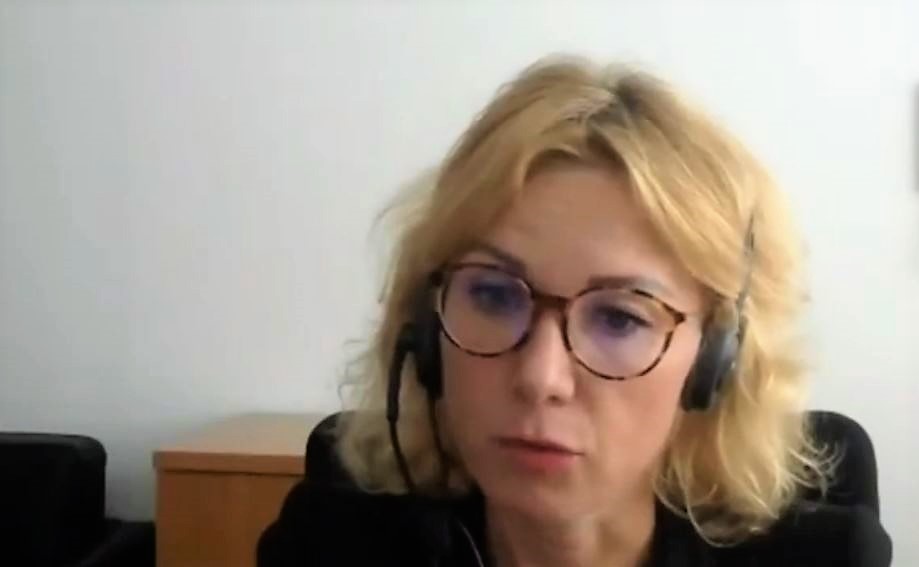Representatives of Eurasian NHRIs and Ombuds institutions, OHCHR, the Council of Europe and the European Ombudsman Institute (EOI) meet on 12 October 2021 for the 5th International Conference “Human rights protection in Eurasia: exchange of best practices of ombudspersons” organized by the High Commissioner for Human Rights in the Russian Federation, Ms. Tatiana Moskalkova, to discuss the topics and exchange best practices in the fields of the rights of the persons with disabilities and environmental protection. Croatian Deputy Ombudswoman Dijana Kesonja took part in the second panel and shared Croatian NHRI’s experiences of working in the latter area.
Opening the environmental panel, Commissioner Moskalkova provided an overview of the relevant international instruments and mechanisms, underscoring the importance of environmental protection on all levels – from the national to the global – and stressing the competences of NHRIs and ombudsman institutions in this field.
Presenting our work, Deputy Kesonja recounted the fact that the topics related to the intersection of environmental protection and human rights have been featured in our annual reports since 2013, with an especially detailed chapter included in the 2017 report to cover the event of the fire affecting the coastal city of Split and impacting the environment and the local population. In 2014 the Ombudswoman issued a special report covering the human rights effects of the catastrophic floods hitting the Eastern regions of Croatia.
Deputy Kesonja especially underscored our work in 2020 in the form of a special report submitted to the Croatian Parliament on the topic of the right to a healthy life and climate change in the Republic of Croatia in the period 2013-2020 in the context of the global climate movement and the COVID-19 pandemic, emphasizing the richness of the data it was based on, corroborated by our field visits, as well as the recommendations it addresses to the relevant stakeholders at both the national and the local levels. The one that warrants special attention calls on the Croatian Parliament to proclaim the state of environmental and climate crisis and step up its efforts to protect the Constitutional values of nature and environmental protection and the right to a healthy, clean, safe and sustainable environment.
In her speech, the Ombudswoman of Albania, Ms. Erinda Ballanca, stressed the fact that the responsibility for environmental protection lies not only with the governments but with all of us – the citizens and other stakeholders, including ombudsman institutions. To be able to devise better solutions for environmental problems, we need to understand them better; thus, we need education on these topics both within the educational system but also within our institutions. We need to adopt normative frameworks for environmental protection, both at the national as well as the international levels. As a step in that direction, in 2020 the Republic of Albania adopted the Climate Change Act, with the aim of regulating the actions of various national stakeholders in that area.
Mr. Josef Siegele, Secretary General of the European Ombudsman Institute, shared examples of good practice from Austria, where certain regions, such as Tirol, have specialized environmental ombudspersons and environmental prosecutors.
Ms. Camilla Mateucci, representative of the International Committee of the Red Cross (ICRC) focused on the intersections between the consequences of conflicts and humanitarian crises and those of climate change. These result, Ms. Mateucci noted, in restrictions to the access to food and water, diminished accessibility of the basic services as well as the weaking capacities of the local institutions to support the local populations, which can affect the access to the basic resources at continent-wide levels and, consequently, influence migration flows.
It is vital that all competent stakeholders work together in dealing with the consequences of environmental challenges, stressed Director of the Office of the Directorate General of Programs of the Council of Europe Ms. Verena Taylor. The states must support ombudsman institutions’ work by providing them with sufficient resources and by respecting their independence. State support is especially important in the area of environmental protection, given that fact that human rights defenders engaged in it often face threats and reprisals. Crises such as the current one caused by COVID, are one of the consequences of climate change and will happen more and more frequently, said Taylor. Ombudsman institutions play a crucial role when it comes to human rights protection in such situations and must be able to monitor the level of harmonization of the measures adopted to deal with the crises with both the national as well as the international human rights frameworks.
The role of ombudsman institutions in environmental protection and the importance of the cooperation of all of the relevant stakeholders figured as the main messages of this event, held only days after the recent recognition by the Human Rights Council of the right to a healthy environment as a human right.


